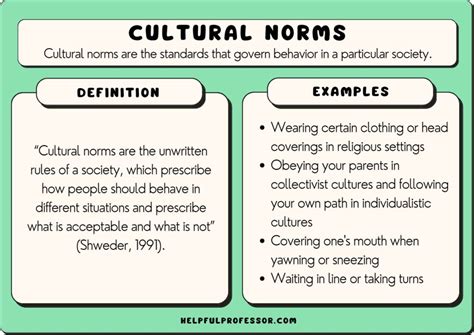Cultural norms are the unwritten rules that govern behavior in a particular society. They are the shared beliefs, values, and expectations that shape how people interact with each other and the world around them. Cultural norms can vary widely from one society to another, and they can change over time as societies evolve.

Importance of Cultural Norms
Cultural norms are important because they provide a sense of order and predictability to social life. They help people to know what is expected of them and how to behave in different situations. This can reduce uncertainty and anxiety, and it can make it easier for people to interact with each other.
Cultural norms also help to maintain social cohesion. They provide a shared set of values and beliefs that bind people together and create a sense of community. This can be especially important in diverse societies, where people from different backgrounds may have different values and beliefs.
Types of Cultural Norms
There are many different types of cultural norms, but they can be broadly classified into two categories:
- Folkways are the everyday customs and practices of a society. They are typically informal and unwritten, and they can vary widely from one region to another. Examples of folkways include the way people greet each other, the way they eat, and the way they dress.
- Mores are more serious social norms that are considered to be essential to the well-being of society. They are typically more formal and written down, and they can vary widely from one society to another. Examples of mores include laws against murder, theft, and rape.
How Cultural Norms Are Created
Cultural norms are created through a process of socialization. This process begins in childhood, as children learn the values and beliefs of their parents and other adults in their community. As children grow older, they continue to learn about cultural norms through their interactions with peers, teachers, and other members of society.
How Cultural Norms Change
Cultural norms can change over time as societies evolve. This can be due to a variety of factors, such as changes in technology, economic conditions, or political systems. When cultural norms change, it can create a sense of uncertainty and anxiety, as people try to adjust to the new rules.
Benefits of Cultural Norms
Cultural norms can provide a number of benefits to society, including:
- Order and predictability: Cultural norms help to create a sense of order and predictability to social life. They provide people with a set of expectations about how to behave in different situations, which can reduce uncertainty and anxiety.
- Social cohesion: Cultural norms help to maintain social cohesion by providing a shared set of values and beliefs that bind people together. This can be especially important in diverse societies, where people from different backgrounds may have different values and beliefs.
- Cultural identity: Cultural norms help to create a sense of cultural identity. They provide people with a shared sense of belonging and a way to express their unique culture.
Challenges of Cultural Norms
Cultural norms can also pose a number of challenges, including:
- Cultural relativism: Cultural norms are relative to the society in which they exist. This means that what is considered to be normal in one society may be considered to be strange or even offensive in another society. This can lead to misunderstandings and conflict between people from different cultures.
- Social control: Cultural norms can be used as a form of social control. They can be used to pressure people to conform to the group’s expectations, even if those expectations are not in their best interests. This can lead to feelings of guilt, shame, and anxiety.
Conclusion
Cultural norms are the unwritten rules that govern behavior in a particular society. They are the shared beliefs, values, and expectations that shape how people interact with each other and the world around them. Cultural norms can vary widely from one society to another, and they can change over time as societies evolve.
Cultural norms can provide a number of benefits to society, including order, predictability, social cohesion, and cultural identity. However, they can also pose a number of challenges, including cultural relativism and social control. It is important to be aware of the role that cultural norms play in our lives and to understand how they can affect our behavior.
